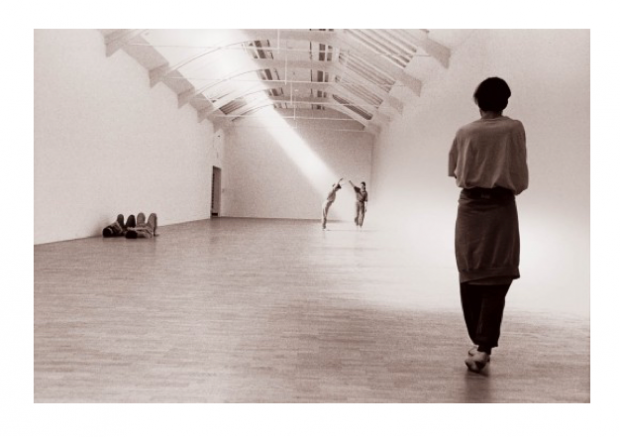My ancient Liddell and Scott Greek dictionary of 1849 defines choreia as ‘a dancing, especially with joy’. The word choros has a more technical definition: a round dance, or a dance accompanied with song (hence the word chorus). From whichever word ‘choreographer’ is declared to derive, the British dancemaker Rosemary Butcher, who died last month at 69 after a career barely visible to the public, embodied the first idea in a way that I see with hindsight changed my eyes emphatically in realising the marvellous range of ways to enjoy dance-going.
Choreia: ‘a dancing’ – an act of dancing, a piece of activity, rather than the choros, a dance creation. Choreia: not a joined-up circle of answers in a finished work of art, but something that hasn’t an end product in mind, jazz-like, improvisation, provoking questions uncomplicated by anything else than the pleasure of asking them. There’s no box office tinkle to categorise its worth.
I’ve met endless people who say nervously how they’re wary of contemporary dance because ‘I don’t know anything about it’. They’re thoroughly intimidated by arts-subsidy rich choreographers like Wayne McGregor and Anne Teresa De Keersmaeker who habitually write volumes of patronising, cod-intellectual programme notes that are a long way from the old days of contemporary dance when you might say the Peter Jay school of exclusivity ruled (as in, ‘this piece has been written for three people to understand, and you aren’t one of them.’)
Contemporary dance’s theoretical end once had a mulish charm due to the refreshing contrariness of some of its practitioners. I loved some of the American women who invented the 1960s Judson Church movement – those who wanted gracefulness and all that patriarchal crap, they said, could sod off. No to explanation. Twyla Tharp once erected walls around a dancework to stop people seeing it. She and fellow radical Yvonne Rainer are two of the most engagingly intelligent, emotionally articulate people I’ve met in any area of life, let alone the dance world.
Trisha Brown and Merce Cunningham were still less inclined to explain – their choreography was the child of wild nature, observant of animal movement and timing, playful, using apparent randomness in entrances, exits, collisions or unexplained sequences of movements, theatrical surprises and often lavishly decorated with modern art and music. By the 1990s, American contemporary dance was often over here in the UK, popular now, often lusciously visual and well-endowed with theatricality; Tharp, Brown, Lucinda Childs, Paul Taylor, Mark Morris, and Mikhail Baryshnikov’s White Oak Dance Project introduced us all to unfamiliar Judson Church plain Janes like Deborah Hay and the contact-improvisers.
In the atmosphere of that fertile jungle, I caught up with Rosemary Butcher in one of the experimental little London theatres, the Riverside or the Place. She seemed out of kilter even with the Americans. Here was choreography that seemed conceived with very little interest in either the technique of steps, charisma or musical expressiveness. Very cheap. A dancer or two, acres of empty space, functional light, maybe a bit of video, but generally sparsely decorated. Nubbly, ordinary moves, nothing much physically, rehearsal clothes. How untheatrical could you be?
But then I saw it once or twice in a gallery, the Royal College of Art, Tate Modern, where it seemed to fit silently, become absorbed into the blank walls and unexpected perspectives.
It’ll sound like the worst pretentiousness to bring in the prefix ‘meta’ here. One of Butcher’s students said about her teaching: ‘Rosemary has a very unique way of facilitating a meta perspective on making through moving.’ Sorry, but I do actually like this observation. We all know now about metadata, that inner life to your decisions and expressions that reveals more than you intended to show. Butcher’s work was a metadance; she made through moving; she staged her works to be about dance, a dancing, choreia, not a dance.
Her monastic, minimalist works apparently opposed lavishness, self-conscious inventiveness, or provocation, but of course had to stir the audience’s imaginations to prove they were alive. Butcher dissected movement into smaller and smaller bits, repeating deliberately, like rhymes in rhythmic poetry, knowing that the watcher’s brain would be reacting emotionally and changing as the repetitions accumulated, right up to the limit of what you accept as dance at all. I remember pieces like Episodes of Flight or Fractured Landscapes, Fragmented Narratives as creations of great seriousness and curiosity, but also with the qualities that you love in dance, of heedlessness, lightness and humanity.
She made me think about space itself, and the person’s place in it – how space is to the dancer what silence is to the actor, a blank to be broken, interrupted or invaded, or to be incorporated in a mutually absorbent exchange. How the floor isn’t necessarily the movement’s base, how walls are sometimes very solidly present and necessary in the dance construction, and sometimes they’re wiped away. Trisha Brown’s work is great at this, so are some of the great, hovering corps de ballet sequences in the classical ballets by Marius Petipa, like La Bayadère and The Sleeping Beauty.
Trusting instinct and an open mind when I watched Butcher’s work, I very often felt that basic human twang of joy. Agreed, sometimes it was tedious and thin. But there is a god in small, intense things, and Butcher was on that mission, never apologising, never explaining.






Comments